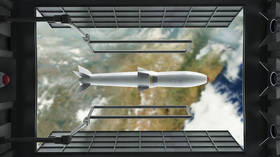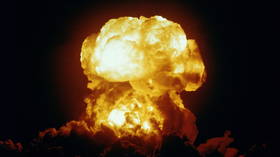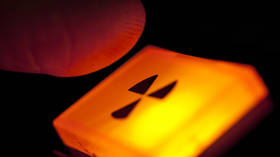Global nuclear weapons spending calculated

Global atomic weapon spending saw a significant increase in 2021 according to the latest International Campaign to Abolish Nuclear Weapons (ICAN) report published on Tuesday.
In just one year, the nine nuclear-armed nations - US, China, Russia, France, India, Israel, North Korea, Pakistan and the United Kingdom – spent a total of $82.4 billion on upgrading and maintaining their estimated 13,000 nuclear weapons, marking a 9% hike from the year before, according to ICAN’s estimates.
The report, which is ICAN’s third annual summary of global nuclear spending and is titled ‘Squandered: 2021 Global Nuclear Weapons Spending,’ highlights that in total, the world spent a combined $156,842 every single minute of 2021 on weapons of mass destruction, amid an ongoing pandemic and rising global food insecurity.
ICAN details exactly how much each of the nine countries spent on atomic weapons, lists the companies that profited, and the lobbyists hired to keep nuclear weapons in business.
The United States turned out to be by far the biggest spender on nuclear armaments in 2021, having spent $44.2 billion – four times more than the next in line. China was the only other country to exceed the ten-billion-dollar mark, at $11.7 billion spent, while Russia holds third place at $8.6 billion. The UK spent $6.8 billion, France, $5.9 billion, and countries like India, Israel and Pakistan each spent a little over a billion on their arsenals in 2021. In last place is North Korea, which spent $642 million.
The report goes on to question why and how these countries spent so much on nuclear weaponry amid myriad global issues such as food and energy shortages, but comes to the conclusion that the biggest driver of nuclear weapon spending was not security concerns but, rather, business interests.
Certain US military contractors have allegedly made a fortune from nuclear weapons-related contracts according to ICAN, and these companies spend a big chunk of their income to hire lobbyists and fund think tanks that encourage politicians to spend even more on weapons of mass destruction.
According to the report, Honeywell International made $6.2 billion from nuclear tenders in 2021 and spent an additional $7 million on lobbying. Northrop Grumman got $5 billion and used $11.6 million for lobbying. Lockheed Martin received $1.9 billion from the industry and spent $16.9 million on lobbying.
The authors of the report note that after examining thousands of contracts, reports and lobby disclosures, they estimate that over a dozen private companies received a total of $30.2 billion in nuclear weapon contracts in 2021.
“Those companies then turned around and spent $117 million lobbying decision makers to spend more money on defense. And they also spent up to $10 million funding most of the major think tanks that research and write about policy solutions about nuclear weapons,” wrote ICAN.
The report goes on to note that all this spending has done nothing to deter any sort of conflict and that recent geopolitical events in Europe have only served to further line the pockets of those who are tied to the nuclear weapons industry.
“We were told that the billions invested in thousands of weapons of mass destruction with the power to destroy the world many times over was the price to pay for peace in Europe. Instead, those billions went to line the pockets of the powerful who profit from the production of weapons of mass destruction.”
The authors stress that the report demonstrates that “nuclear weapons don’t work” as they have failed to deter conflict in Europe.
“This is why we need multilateral disarmament more than ever. The first meeting of states parties to the Treaty on the Prohibition of Nuclear Weapons in Vienna [from June 21 to 23] could not come at a better time," ICAN Policy and Research Coordinator Alicia Sanders-Zakre said.
ICAN is a Nobel Peace Prize-winning, Geneva-based international coalition that has been actively campaigning for the respect and full implementation of the Treaty on the Prohibition of Nuclear Weapons which it helped adopt at the UN in 2017. The treaty has been ratified by 59 countries around the world so far, however not a single nuclear state has yet to sign it.














